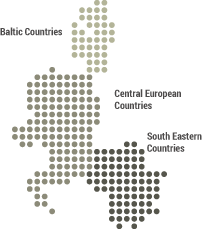SI in New Member States
Background
Accounting for path dependency and context specificity, it becomes evdident that social innovations are driven by history, socio-economic and social context reflected in structures, behaviours and institutions. In this sense New Member States (NMS) of the EU differ from the Old Member States (OMS) in that they have experienced different overall economic system up to about couple of decades before their joining the EU, the effects of which are still sensible. For instance, the welfare regimes in the NMS are, in most cases, not easily comparable to the models in the OMS.
Objectives
Against this backdrop, the overall goal is to identify the specifics of social innovation in the New Member States with special regard to transition countries (EU-10) to allow for the elaboration of adequate public policies instruments, business models and indicators.
Methodology
Tacking stock of former research undertaken by CIS, three groups of countries will be distinguished: South Eastern countries (Bulgaria, Romania), Central European countries (Hungary, Czech Republic, Poland) and Baltic states. Common characteristics and diversities related to the economic opportunities and motivations for social innovations, their roots and future implications, especially as compared with the EU-15 countries, will be identified. More specifically, the role of innovation transfer, types of innovation, implementation conditions plus the social and economic impacts of innovation activities will be studied.
Besides, the relations of social innovativeness to (overall or non-social) innovation capacity and institutional quality will be analysed, and, consequently, the key factors identified which make the concept of social innovation and their policy stimulation in EU-10 specific. The analysis will be based on
- 1 questionnaires for authorities,
- 1 expert panels for mapping of bottom-up activities, and
- 1 desk research for state-of-art knowledge especially in academic and policy making areas.
Project databases available for ESF and ERDF projects in individual countries and for other supporting funds for social entrepreneurs and innovators will be utilised (e.g. Ashoka and SozialMarie). For panel discussions, the contacts with national expert networks (both academic and government based) will be used. Due to previous good experiences, the expert panels will be held virtual using moderated online-platforms. The results are summarised and fed into the Go to Theoretical Foundationtheoretical foundation, Go to SI Scenario BuildingWP2, Go to Collecting EvidenceWP3, Go to Indicator SetsWP5, Go to Policy InstrumentsWP6 and Go to SI Impact AnalysisWP7
Basic Information
-
Coordinator
CIS -
Contact
Anna KADERABKOVA -
Start date
01/2014
New Member States (EU10)













